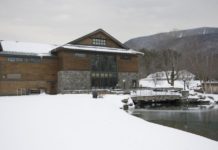As Lanz points out, Babcock felt football and baseball were not sports but games because they were confined to circumscribed and static playing fields. Conversely, Babcock reasoned that in true sports, a person is forced to be alert to the totality of changing complex surroundings. True sports would not hinge on a one-point loss that would cast gloom over an entire week as if a person’s closest friend had died. From true sports, Babcock declared that a participant bags the scene and participation in the natural world as the biggest trophies of all, regardless of whether or not the hunter got his prey. Neuffer, who often accompanied ’Vilah on hunts, reported that he never took a rifle. The walk and talk in nature with his friend were the rewards.
And, on the subject of trophies, Babcock critiqued the mad scene of big game hunters flying all over the world in search of the big and biggest animal or of killing something massive and exotic. His 1958 classic I Don’t Want to Shoot an Elephant names his prime sport as the lowly bobwhite partridge. In this philosophy, Babcock was obviously no Ernest Hemingway.
Babcock believed that being in nature was better for a man’s nerves than a doctor’s pills. He wrote, “A fishing boat is better than a psychiatrist’s couch.” He declared, “Farmers seldom have nervous break-downs. They haven’t time. People who lead a brisk, outdoor existence don’t go in for neuroses, psychoses, and other expensive and fashionable complaints.” In his story “The Bug in the Clock,” he said, “It ought to be against the law to let a boy grow up in a city.” He felt that a stirring day in the field for young and old alike “purges the mind of mental constipation.” He added, “What this country needs right now is a mental laxative.” In another essay, he declared, “When I need a psychiatrist, I go fly fishing.”
Babcock was a popular writer for Field & Stream, Outdoor Life, and Sports Afield. He placed his first story in Field & Stream in 1934. He went on to publish five major books, beginning with My Health Is Better in November in 1948. It was illustrated by his colleague, art history teacher Augusta Rembert Wittkowsky, one of my favorite teachers at Carolina. Babcock’s last book, Jaybirds Go to Hell on Friday, came out shortly before his death on Dec. 10, 1964, just before Christmas break at the end of fall semester. Even as a junior English major, I was not aware of its publication or even that he was an author. Such was Babcock’s modesty. He was never one to seek the spotlight. This is the way one of his students acknowledged his passing: “Professor went hunting and forgot to come back.” Off hunting, yes. That is why classes did not see his bird dogs anymore.
When he was confined to the city limits of Columbia, he was a vegetable farmer who delighted in giving his friends heirloom tomatoes said to be as large as grapefruits. He had a small farm outside of town where he kept bees and successfully labored to increase the bobwhite population. He gardened year-round. In one of his last letters to his editor, he spoke not of hunting, fishing, or writing but of his vegetables and compost heap.
He and Alice loved camellias. She wore one pinned to her blouse every day during blooming season. In Babcock’s day, it was a tradition in much of South Carolina, especially at church, but is seldom seen today. This small detail reveals much about the shift in values and cultural norms and something of the nature-deficit syndrome from which Babcock felt urbanized moderns suffer. The Babcock Camellia Garden at Carolina preserved some of the couple’s specimens.
From 1926 to 1964, Babcock saw dramatic, and in his view, catastrophic change. He was never a so-called “progress” man. He hated the idea of telescoping distance with fast travel of any kind. He called himself a stay-at-home, “not a far-roamer and saga-seeker.” He said he never boarded “any sort of an airplane” even “when it was squatting on its haunches.” He told the story of the mountaineer who was persuaded to take his first flight. When asked how he liked it, he thanked the pilot for both rides. “What do you mean by both?” the pilot asked. “My fust and my last,” he replied. Babcock understood. The story reminds me of the old gentleman who declared after his first and last flight that when he went up again it would be with Jesus, and that no one has any business in an airplane but doctors, lawyers, and fools. I had always agreed until a recent medical emergency required an airlift, a flight that likely saved my life and made me able to write this essay.
Babcock witnessed the state’s commercial and industrial growth with foreboding. His whole existence had testified to the dangers implicit in the “money as measure” philosophy he saw increasing in America in a “cash register evaluation of life.” He disliked industrial agriculture in particular because it transformed the landscape into something less diverse. It poured poisons on the land and squandered soil. Agro-industry reduced the number of farmers and sent people to cities. Most dramatically of all, it reduced wildlife, especially his bobwhites. Babcock felt that it undermined Southern culture itself in its most central agrarian values and attributes. He wrote that industrial farming’s barbed wire “was nothing short of an invention of the devil.” It replaced the hedgerows and rail fences that were perfect habitats for wildlife.
Babcock felt that the massive new lakes came at a heavy price to both the land and the people’s collective memory that undergirded and strengthened the culture itself. Wealth came at a price not to be quantified by dollars. As to wealth, Babcock wrote: “Any man who has what he wants and has $2.50 in his pocket is well-to-do … I have never kept a budget. The idea is repugnant to me, and I am probably the world’s worst bookkeeper … we just spend what we need for hunting and fishing. Whatever is left over goes for housekeeping, clothing, etc.” As for his salary as a teacher, he declared that although small enough, he really didn’t need much and was getting paid more than he was worth anyway.
Babcock did not live to see the state’s quail population decrease more than 90 percent in the 50 years after his death. This would have hurt him the most. His phrase “The Bob-white is a gentleman” is loaded with special meaning. Babcock intimated that the concept of gentleman was itself being even more dangerously threatened than the bobwhite. They seem to have declined together.
As Dr. Lanz points out in his Chronicles essay, today, sadly, Babcock would likely have few if any friends in an American university. Lanz feels that the strident politicizing of literature departments “would have been beyond his comprehension.” He adds that sadly there would be little tolerance for a man like Babcock who thought that writing about things that interested the average person was important.
A glass and concrete high-rise replaced Davis College in 1967 to house the English department, which is where I did my graduate study. The new building’s low-ceilinged rooms both allowed for and required better “climate control,” and the classrooms had no windows. As Babcock might say, the structure was indeed not designed for the climate but rather to control it and create a barrier to nature. It is hard to envision Babcock there. He would, no doubt, have made much of the term “climate control.”
I highly recommend the works of Havilah Babcock — any of them and all of them. He and the comfortable gentlemanly rhythms of the life of his time and place are preserved there. It would be difficult to argue that his writings do not represent a healthier outdoor world of particularities, of familiar family fields and homeplaces, and of bobwhites, gentlemen, and ladies who take the time to pin a camellia to a blouse. Above all, as a writer, Babcock understood literature’s long view. The reader can benefit from the wisdom of this view expressed in the carefully honed prose of works that are to be savored and pondered rather than rushed through and quickly forgotten.
Dr. Kibler received his doctorate in English at the University of South Carolina and taught for many years at the University of Georgia. A poet, novelist, and cultural historian, he now writes and farms at his home in Newberry County.
Credit: Source link































